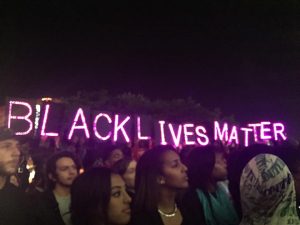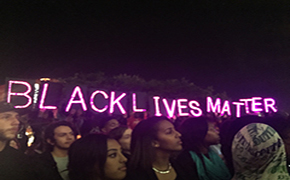On Tuesday, Nov. 25, senior Azani Creeks gathered with almost 200 protesters near the Dallas Police Department headquarters. The crowd had assembled in an outcry against the controversial decision made by the jury the day before to not indict police officer Darren Wilson, who shot unarmed 18-year-old Michael Brown. The jury reached their decision after two days of reviewing extensive evidence, stating that they could not charge Wilson with a probable cause to arrest him. Creeks, who did not agree with the jury’s decision, joined the protest.
“I went with my dad, and we chanted things like ‘hands up, don’t shoot’ and ‘no justice, no peace,’” Creeks said.
Creeks attended the prayer vigil with local pastors that day at 5 p.m., and the actual protest began at 7 p.m., followed by speakers.

PHOTO BY AZANI CREEKS
Other students share Creeks’ beliefs. Senior and Student Diversity Board Chair Anesu Nyatanga supported the protests because they “draw awareness to the problems and struggles that people are facing. When we think about any major change or any major shift in our society or our culture, it’s been brought around by protests.”
The main focus of the rally wasn’t solely focused on Ferguson. According to Creeks, the protest was also “about the injustices inflicted by DPD. There have been 70 unarmed people killed by police in Dallas since 2003, and none have been indicted.” Creeks added that it was important to note that the Ferguson case was “not an isolated incident.” Most recently, Daniel Pantaleo, a white New York police officer, was not indicted by the jury after using a chokehold on Eric Garner, an unarmed black man.
Upper School Guidance Counselor Dr. Margaret Morse, who also sponsors the Student Diversity Board, said that “there are a lot of strong emotions associated with the Brown and Garner cases. I think that it would be good as a community to talk about what this means nationally, locally and personally.”
Nyatanga hopes to organize a forum to discuss the recent discussions led by the Student Diversity Board in a way where everyone’s opinions can be heard. Nyatanga said that she, herself, reacted strongly to the cases.
“The thing that upsets me the most about the non-indictments is that I’m not surprised. And I think that is terrible. It’s terrible that I am only 17-years-old, and I’m not at all surprised by the normalcy in which black bodies litter the streets,” Nyatanga said. “I’m appalled that society has conditioned me to accept this as the norm.”
Creeks agreed, but she was encouraged by the protest.
“Every race was represented,” Creeks said. “It was very powerful in letting us know that Americans of all races can empathize with what we’re going through.”
– Courtney Le







